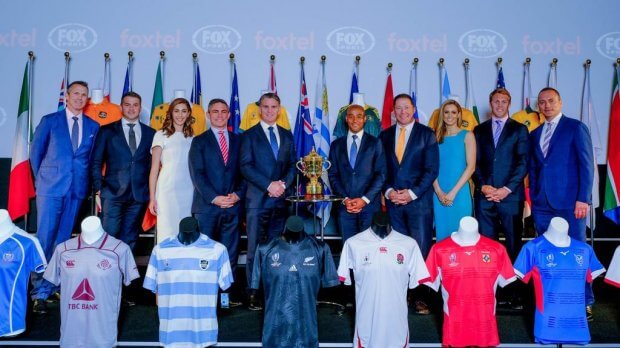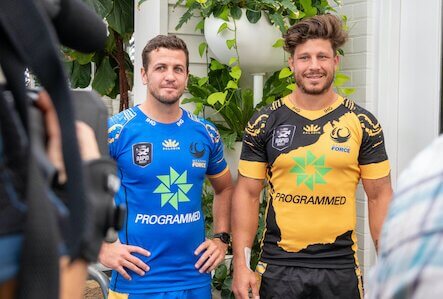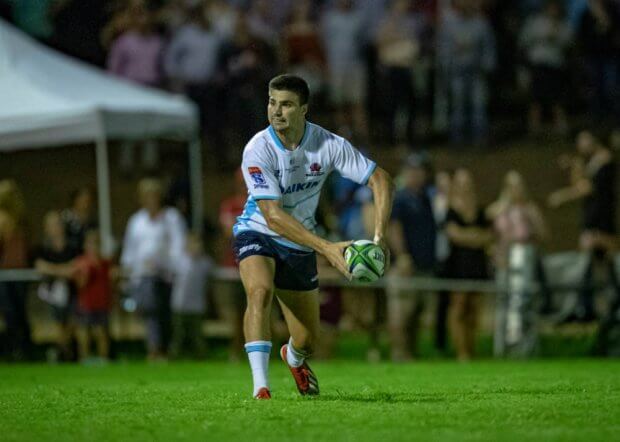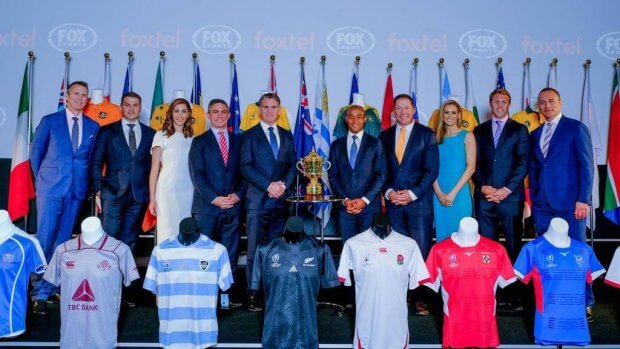This year has thrown so many elements of our game into sharp focus.
With months of no actual rugby to talk about, we’ve spent hours analysing board decisions, player salaries, media rights and future competition structure.
It’s now time to talk about an area of the game that’s often complained about but rarely analysed – match commentary.
Commentary matters. It colours our impression of a game both consciously and unconsciously. Good commentary can enliven a contest, and educate both new and old hands to the play and tactics used by both teams. It highlights excellence and criticises inadequacy.
Rugby now sits in a state of flux. The viewing public is faced with a new competition with limited crowds, experimental law variations and plenty of new faces. The role of the Fox Sports team in many ways is more crucial than ever, to guide us through the twists and turns of an uncertain but exciting future.
Sadly for us they are failing, right at the time we need them to succeed.
Phil Kearns has become something of a lightning rod, but the problems are far deeper than that. The vast majority of the commentary we receive is under-researched, uninspired and straight out boring. The most concerning reason for this failure seems to be genuine laziness and it can’t go unacknowledged any longer.
The skeleton staff
Fox Sports have been slowly paring back their rugby department, and in the last 12 months we’ve seen the departure of Sean Maloney, Nick McArdle, Steve Hoiles, Drew Mitchell, Louise Ransome, Natalie Yoannidis, and many others both on or behind the camera.
The surviving talent now consists of Greg Clark, Tim Horan, George Gregan, Phil Kearns and Rod Kafer.

While it’s unfortunate for those who have lost their jobs, it’s also been unfortunate for the viewers and wider rugby public.
With no midweek shows now, the crew have been reduced to part-timers. It might be why these particular commentators were kept on. I have no knowledge of salary payments, but with successful business careers Kearns, Gregan and Horan can maybe afford a weekend ‘passion project’ on limited wages. Unfortunately that leads to a half-arsed approach we are now seeing, and we all deserve better.
Forgetting their homework
Commentary is roughly two hours of work (four if you are covering both games), for which our crew has a whole week to prepare. Unfortunately there is no evidence any preparation is done at all.
The performance of the crew on Saturday in the Western Force vs Waratahs match was a sad summary of where we now stand.
Make no mistake, the Western Force are THE story of SuperAU. From their exile in 2017 they have scrapped and brawled and carved out something that looks like a future for rugby in Perth. They have developed players and opened up local pathways. It’s a truly remarkable story that they can even field a team, let alone think about winning games.
And yet there they were on Saturday, absolutely giving it to the Waratahs with both barrels.
The vast majority of the viewing audience wouldn’t know most of the Force players. They might remember Jono Lance, Ian Prior and Greg Holmes. As an invested fan I knew a few more than that, but certainly didn’t know the stories of guys like Byron Ralston or Tevin Ferris. The commentary team on Saturday night, therefore, had an important job in telling us these stories.
Unfortunately our team of Greg Clark, George Gregan and Rod Kafer didn’t know them either.
This lack of preparation is obvious from the very start of the coverage, as Gregan reads through the Force team sheet. Now this isn’t the place for in-depth analysis, but some level of light shed on who these players are would be nice given you have a whole week to prepare.
Gregan’s exact words: “We’ve got a good tight five here… Wagner, Feleti… Kaitu’u… Longbottom. Big strong men. Thrush, Lee-Warner. Thrush from… the Wellington team. We’ve got Stowers, Stander and Ferris in the back row. They will have to be really strong on the ball.”
He stumbles over a pronunciation. He forgets the name of the Hurricanes, or that Thrush actually played for the All Blacks as well. But mainly he gives us absolutely nothing about any of these guys. He could have told us that Kieran Longbottom has walked a long road to be here, recently returning from a stint in the UK at Saracens. Or that Tevin Ferris was schooled in NZ but has since been a local WA product who played for Alan Jones’ Barbarians team against the Wallabies. Something. Anything.

Greg Clark is no better. While he tries to tell us about the Force players, the best he can do is by reading the biographies in the media guide. When Byron Ralston scores the Force’s first try, Clarkie tells us he is “the 20 year old, born in Darwin, went to Gregory Terrace, played for Brothers in Brisbane, Australian under 20s… and he’s got his first meat pie in Super Rugby.” No more.
We hear that Henry Stowers has played for Samoa, and Feleti Kaitu’u went to Nudgee College but was born in Newcastle. Jack McGregor played for the Australian under 20s.
The core of the Force side was actually together through the NRC last year, winning the title. While we hear that factoid, we don’t hear one more mention of that tournament or that team.
While this is shameful in its laziness, it’s also profoundly uninteresting. Citing a player’s pedigree like a shopping list should be just the start of our knowledge of them, but at Fox we get it for entrée, main and dessert.
Gordon Bray used to be known for always including an obscure backstory about a player’s aunt watching on from their couch in Bumcrack, Queensland. It got a bit tired after a while, but at least it demonstrated that he had done some research before driving to the game that night.
Breaking down a complex game
Rugby is a multi-faceted, complicated game. It is often derided by outsiders for this complexity, whether it’s the rulebook, or the set piece, or the defensive tactics used by teams.
It’s also a game with quite a bit of downtime, as scrums are set (and reset), penalty goals are lined up, or players are treated for injury. A skilled commentator can use these stoppages to real effect, breaking down the state of the game or picking apart a recent backline move.
Unfortunately our blokes have just stopped trying. During the Reds vs Rebels game on Friday night, an extended stoppage takes place as Matt Toomua lines up a kick at goal. In that time, Greg Clark takes the time to tell us that both Toomua AND James O’Connor are 30.
Fraser McReight goes down injured later in the game, and after a long period of silence Clark tells us he’s just 20 and was the Under 20s player of the year last year (idea for a drinking game: drink every time Clarkie mentions a player’s age. You will be blotto by the 15 minute mark). Kearns then tells us the referee wants the ball in the scrum faster, a fact we already know because we all heard the referee say it just seconds before through the ground microphone.
Rod Kafer is the best member of the team (Horan is pretty decent too), but even he is a shadow of his former self. Kafe’s Chalkboard was a feature of old Super coverage, doing exactly what rugby coverage is meant to do – breaking down the game’s complexities in a way that was interesting and easy to understand. It was ahead of its time. Youtube pundits like Squidge Rugby now use a similar format, as well as our own pundit the Dead Ball Area.
But sadly the chalkboard has been wheeled away, and what we now get from Kafe is comments that veer dangerously close to analysis but never quite get there. We hear the Force coach Tim Sampson plays an “inventive attacking structure” but sadly that structure is never explained, nor is its inventiveness.
In Hoiles and Mitchell Fox had two recent former players with direct experience of the modern game. They could tell you what it’s like to play alongside Michael Hooper, be coached by Michael Cheika or tackle Beauden Barrett. They could also shed light on the way modern coaches structure their defensive lines, or attacking pods, or lineout mauls.
Instead we are left with a group of commentators who are unmatched in their playing achievements, but with their on-field careers in the distant past. Gregan is the most recent player and he retired in 2007. Since that point the game has changed to a point that is almost unrecognisable, and that fact shines through in every broadcast.
Injecting the excitement
I could forgive many of these shortcomings if the commentary team showed any enthusiasm for the game, but they can’t even muster that. This is easily the most indictable offence as this doesn’t even take preparation, just a love for the game and maybe half a Red Bull.
A Saturday night game between the Force and Waratahs isn’t the Bledisloe, but I want to feel like the game has some intensity, some excitement, some reason for being. But what we get is three blokes plodding through the motions like they’ve done a thousand times before.
Rugby League commentators too often go the other way, dripping with superlatives while lauding a passable Friday night game as “one we will never forget”. I don’t want that, but at least you know they are enjoying the game.

At one point on Saturday night the Force kicked deep to the Tahs corner, and it looked to be heading for a 50-22. Jack Maddocks slid in, caught the ball cleanly, laid it back as his momentum took him across the line, re-entered the field of play, picked up the ball and kicked off his left foot (his non-preferred) under pressure into the Force half. It was an amazing piece of skill. Here’s the transcript from Fox:
Clark (monotone): So Maddocks… keeps it in the field of play… onto the left foot he goes… and he finds touch.
…
Kafer: Good stripe on the left foot.
If that had happened in a League game I reckon the exchange would end in a commentator having to find a new pair of pants, with plans for a statue of Maddocks to be drafted for discussion at half time.
It seems trivial, but this stuff matters. The commentary team set the tone for how we perceive the game and we take our cues from them. If they don’t sound like they can be bothered, why should we?
Phil Kearns’ constant potting of match officials is a big part of this as well. In the early days it was refreshing that someone was saying what many of us were thinking – the opposition team has been offside all day! But that one trick soon became too big a feature of the Kearns act. Now you can’t go five minutes without Kearns bleating about a missed forward pass, or a call that shouldn’t have been made. It’s tiresome and predictable, and it has a tangible impact on the way we think about the game.
A petition was circling to remove Kearns from the box, but he’s just one symptom of a much deeper problem.
Commentary is hard. I don’t want this to be seen as a long whinge, cherry picking incidents from a round of Super Rugby that by any measure was less than inspiring. Greg Clark has had a long career and distinguished himself for the vast majority of it. There is no doubt the other commentators are passionate servants of the game.
However this is their job and it’s clear they can do a lot better than what they are currently. The sad thing is it seems they just can’t be bothered.
Fox Sports need to introduce new blood as a matter of urgency. Sean Maloney is a knowledgeable, passionate and enthusiastic commentator who provides much of what we need in a game caller. He’s an obvious pick.
Beyond that there are hundreds of knowledgeable, interesting people we could call upon. Male and (gasp) female, young and old, local and imported, players and coaches.
I’ll do it for free, and while I promise to do a bit of pre-game homework I will also refer to the 2014 Super Rugby final with annoying consistency. Hey, it can’t be any worse than what we have now.
But when push comes to shove I will just settle for the same team we have now, but for them to show some evidence that they actually care.


